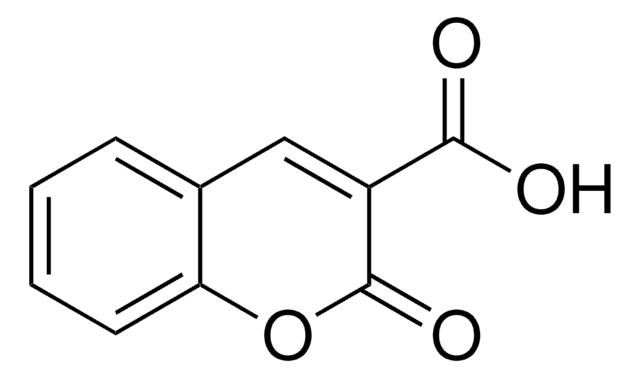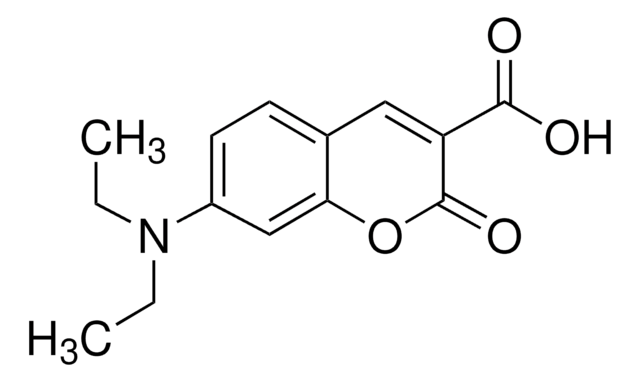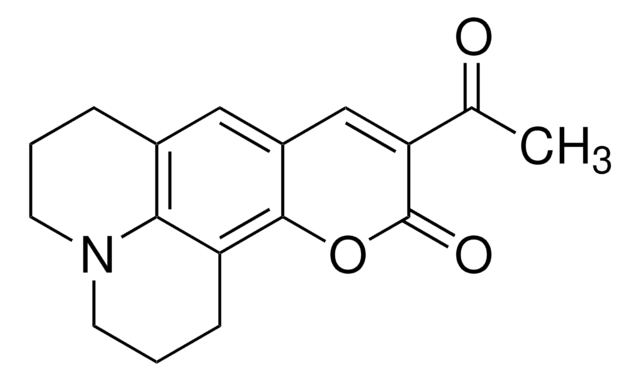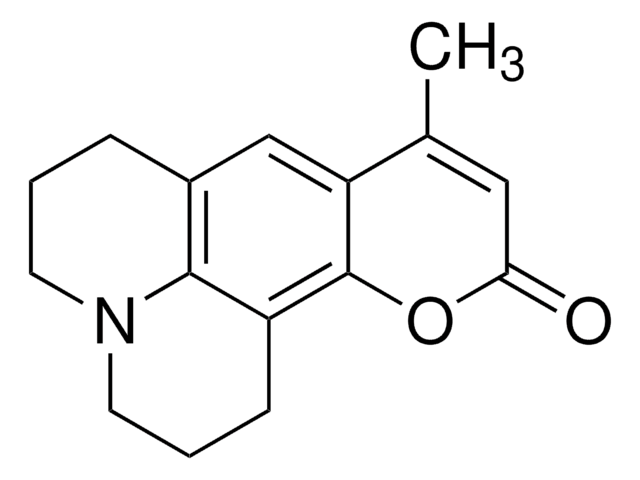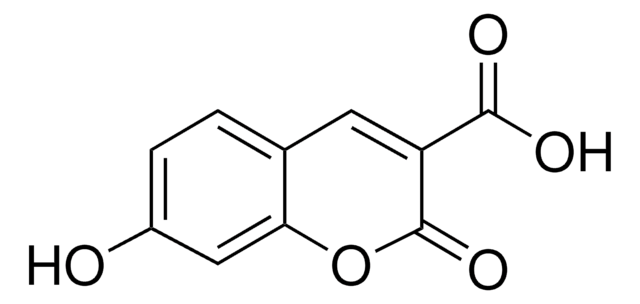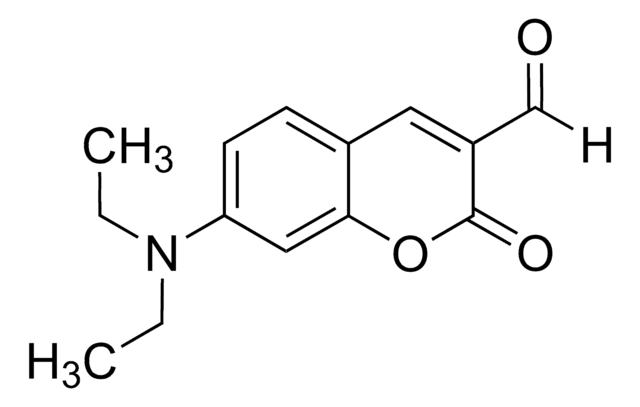393029
Coumarin 343
Dye content 97 %
Autenticatiper visualizzare i prezzi riservati alla tua organizzazione & contrattuali
About This Item
Formula empirica (notazione di Hill):
C16H15NO4
Numero CAS:
Peso molecolare:
285.29
Numero CE:
Numero MDL:
Codice UNSPSC:
12171500
ID PubChem:
NACRES:
NA.47
Prodotti consigliati
Forma fisica
powder
Livello qualitativo
Composizione
Dye content, 97%
tecniche
titration: suitable
Punto di fusione
240 °C (lit.)
λmax
443 nm
ε (coefficiente d’estinzione)
≥26000 at 441-445 nm in ethanol at 0.01 g/L
applicazioni
diagnostic assay manufacturing
hematology
histology
Temperatura di conservazione
room temp
Stringa SMILE
OC(=O)C1=Cc2cc3CCCN4CCCc(c2OC1=O)c34
InChI
1S/C16H15NO4/c18-15(19)12-8-10-7-9-3-1-5-17-6-2-4-11(13(9)17)14(10)21-16(12)20/h7-8H,1-6H2,(H,18,19)
KCDCNGXPPGQERR-UHFFFAOYSA-N
Categorie correlate
Descrizione generale
Coumarin 343 is a small hydrophilic dye. It is unable to penetrate the cell membrane by itself. Coumarin 343 is also known as coumarin 519. Depending on the pH of the medium, coumarin 343 exists in neutral and anionic forms.
Applicazioni
Coumarin 343 has been used in many different applications that include solution dynamic probes, laser dyes, and organic sensitizers in dye-sensitized solar cells.
It is suitable to study photo-induced charge injection into other metal oxides such as TiO2, ZrO2, and ZnO.
It is suitable to study photo-induced charge injection into other metal oxides such as TiO2, ZrO2, and ZnO.
Codice della classe di stoccaggio
11 - Combustible Solids
Classe di pericolosità dell'acqua (WGK)
WGK 3
Punto d’infiammabilità (°F)
Not applicable
Punto d’infiammabilità (°C)
Not applicable
Dispositivi di protezione individuale
Eyeshields, Gloves, type N95 (US)
Scegli una delle versioni più recenti:
Possiedi già questo prodotto?
I documenti relativi ai prodotti acquistati recentemente sono disponibili nell’Archivio dei documenti.
I clienti hanno visto anche
Andreas Steinegger et al.
Chemical reviews, 120(22), 12357-12489 (2020-11-05)
This is the first comprehensive review on methods and materials for use in optical sensing of pH values and on applications of such sensors. The Review starts with an introduction that contains subsections on the definition of the pH value
Ying-Feng Hsu et al.
Physical chemistry chemical physics : PCCP, 18(43), 30086-30092 (2016-11-03)
We performed comprehensive studies on the photoluminescence properties of the carbon dots prepared from citric acid (C-dots
C B Nelson et al.
Physical chemistry chemical physics : PCCP, 19(44), 29991-29997 (2017-11-03)
Zinc oxide (ZnO) in the form of nanoparticles (NPs) is an important nanomaterial due to its catalytic and optoelectronic properties. An interesting aspect of ZnO is that its crystal structure is anisotropic, which leads to a strong 2nd order nonlinear
Valentina M Farzan et al.
Bioconjugate chemistry, 28(10), 2599-2607 (2017-09-19)
We developed a novel technique for the efficient conjugation of oligonucleotides with various alkyl azides such as fluorescent dyes, biotin, cholesterol, N-acetylgalactosamine (GalNAc), etc. using copper-catalysed alkyne-azide cycloaddition on the solid phase and CuI·P(OEt)
Nitin Yadav et al.
The journal of physical chemistry. B, 123(25), 5324-5336 (2019-06-28)
Reverse micelles (RMs) as soft templates have been successfully used in tailoring the structural characteristics (size and morphology) of nanomaterials that in turn have been used in various applications. In this work, we have focused on the local perturbations in
Il team dei nostri ricercatori vanta grande esperienza in tutte le aree della ricerca quali Life Science, scienza dei materiali, sintesi chimica, cromatografia, discipline analitiche, ecc..
Contatta l'Assistenza Tecnica.